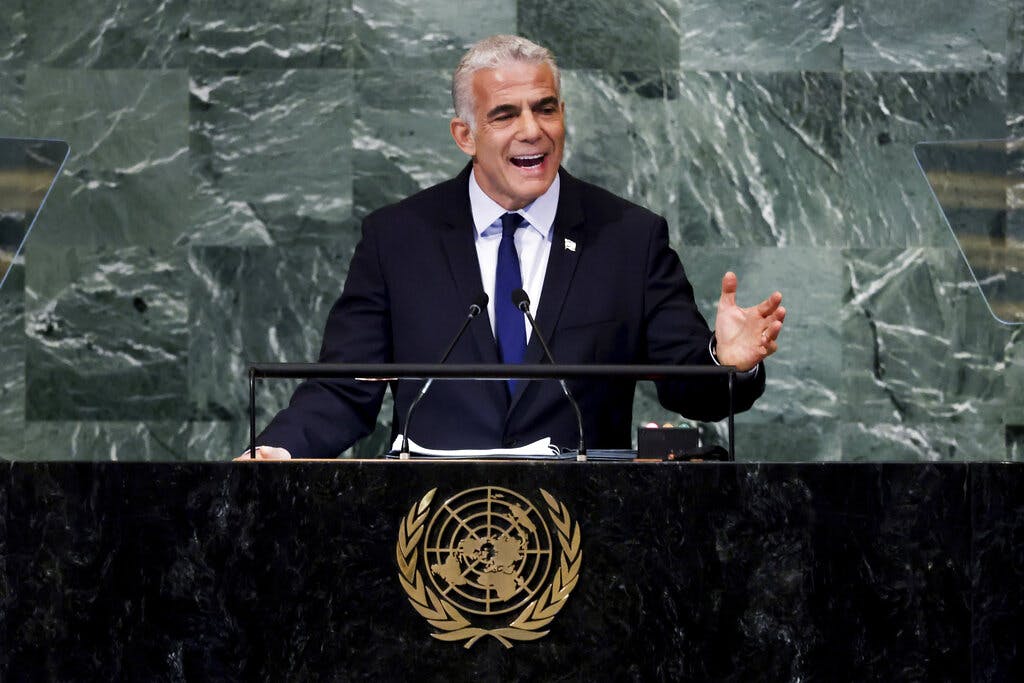Lapid Plays to Home Audience With General Assembly Speech
With an election approaching, the Israeli prime minister’s endorsement of a two-state solution is either a wise move or a major misstep.

Prime Minister Lapid’s decision to use his address at the United Nations to endorse an old chestnut, the two-state solution, is either a bold stroke on the eve of Israel’s November 1 election or political malpractice.
Speeches by heads of state at the annual UN General Assembly’s gabfest are, in most cases, written with home audiences in mind. That is especially true in democracies, and even more so on the eve of elections — which in Israel’s case, is almost always.
Mr. Lapid addressed the UN at 12:40 p.m. EDT. That was a mere 20 minutes prior to the start of prime-time news shows back home — timing that was far from accidental. The premier’s first speech at an arena where one of his predecessors and current top political rival, Benjamin Netanyahu, always made a splash was meant to show Israelis that Mr. Lapid, too, can impress world leaders.
The speech was well-crafted, including a touching moment in which the premier described waking up last year at 4 a.m. to the sounds of sirens, having to carry his autistic daughter, Yaeli, to a bomb shelter as missiles from Gaza threatened his Tel Aviv home. How do you explain any of that to an autistic child who can’t even speak, he asked the audience.
Mildly criticizing the UN, Mr. Lapid said Iran is “interested in the total destruction of the state of Israel, and this building is silent.” He also hinted at a disagreement with Washington over the wisdom of renewing the 2015 nuclear deal, saying instead that only a “credible threat of force” can convince Tehran to back down from pursuing the bomb.
The premier decried “fake news” about Israel, describing a widely distributed photo of a girl supposedly under attack by the Israeli air force that later turned out to have come from Russia. “Vast amounts of money” are invested in such propaganda, Mr. Lapid said, adding that fake news is a threat to all democracies.
That remark, perhaps, was a cue for the audience back home, indicating that he speaks not only of Israel’s enemies but of Mr. Netanyahu, who is often accused of manufacturing news to advance his political prospects.
Yet, it was the endorsement of the two-state solution that created the largest stir in Israeli politics. “An agreement with the Palestinians, based on two states for two peoples, is the right thing for Israel’s security, for Israel’s economy, and for the future of our children,” he said, adding, “a large majority of Israelis supports the vision of this two-state solution. I am one of them.”
A large majority? Even some of Mr. Lapid’s partners in the current ruling coalition criticized that part of his speech. “The endorsement of a terrorist state in the West Bank will endanger Israel’s security; most of the Israeli people won’t allow it,” the justice minister, Gideon Saar, said yestedray, after parts of the speech were leaked to the press.
“There’s no place or reason to bring up the idea of a Palestinian state,” Mr. Lapid’s predecessor in office, Naftali Bennett, wrote on FaceBook. “The government I headed achieved much in the West Bank without concessions that will endanger Israel’s security.”
Mr. Bennett, who is leaving politics after the November 1 election, and Mr. Saar, a former stalwart of Mr. Netanyahu’s Likud party, were instrumental in unseating Bibi, as Mr. Netanyahu is known, and creating the space for Mr. Lapid to become the current prime minister.
Israel’s UN ambassador, Gilad Erdan, presided over the session in which Mr. Lapid spoke, sitting right behind the podium during the speech. Mr. Erdan remains a Likud member. He must have relished that the UN cameras weren’t on him when Mr. Lapid spoke of the Palestinians. He most likely would have winced.
Many in Israel were wondering about Mr. Lapid’s political calculation. Perhaps he thought about the need to shore up the left flank of his base. If so, however, when leftist voters cast ballots for Mr. Lapid’s centrist party in Israel’s multi-party system, further-left parties, like Labor and Meretz, lose out. Weakening them could weaken Mr. Lapid’s wider coalition.
Then again, drawing leftist voters could help Mr. Lapid’s Yesh Atid party to become the largest, or near-largest, in the Knesset. Heading a large faction — even if his party is second largest, after to Mr. Netanyahu’s Likud — could give Mr. Lapid a leg up on composing a coalition with a Knesset majority.
In reality, the Palestinian state is far from the minds of Israeli voters. The top point of contention in this election, as in the last few rounds, is whether to support or oppose Bibi.
In the West Bank, factional leaders are gearing toward a succession war once the ailing Palestinian Authority’s president, Mahmoud Abbas, leaves the arena. When Mr. Abbas addresses the General Assembly tomorrow he will reportedly demand, yet again, that the UN accept the observer State of Palestine as a full member.
Except that this would-be “state” is a mess — divided, corrupt, undemocratic, and overly militant. America, with its veto power, is opposed to its full UN membership, unless it is part of a negotiated agreement with Israel.
How the ever-elusive two-state idea may affect Israeli politics is interesting — but as yet it is far from being a solution to any of the Mideast’s problems.

